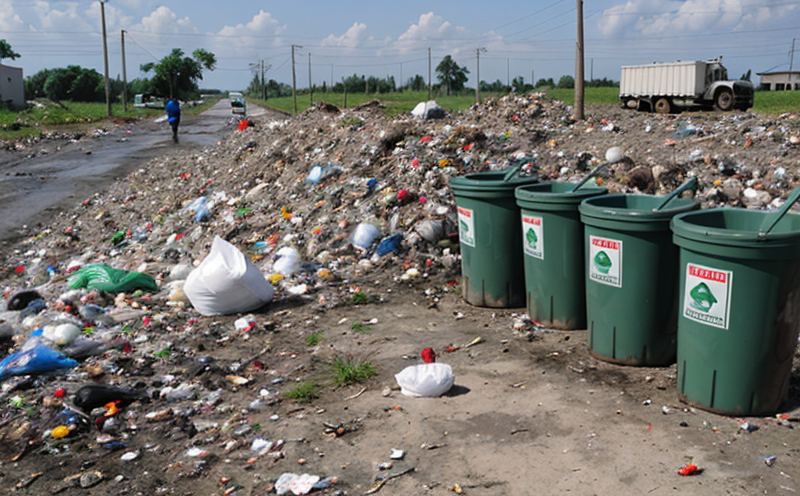EN 12457-2 Leaching of Granular Solid Waste Test
The CEN standard EN 12457-2 specifies the method for determining leachate from granular solid waste. This test is critical in assessing the potential environmental impact that landfills and other disposal facilities may have on soil, water resources, and ecosystems. The granular nature of the waste samples requires specific handling to ensure accurate measurement of leachable components.
The procedure involves simulating conditions similar to those found in a landfill environment. A known quantity of waste is placed into a container with distilled water, which then undergoes agitation over a specified period. This process allows for the leaching out of contaminants such as heavy metals, organic compounds, and other potentially harmful materials.
The collected leachate is analyzed using various analytical methods to quantify the concentration of target pollutants. These tests are essential for regulatory compliance and informing waste management strategies aimed at reducing environmental harm. For instance, it can help in determining appropriate landfill liner thicknesses or identifying suitable alternative disposal sites.
Understanding the leaching behavior of different types of solid wastes is crucial for the design and operation of landfills and other waste containment facilities. By implementing this test method early in the project lifecycle, stakeholders can make informed decisions about waste treatment processes and post-disposal management practices.
- Why Choose This Test:
- To ensure compliance with environmental regulations
- To support informed decision-making for landfill design and operation
- To minimize potential environmental impacts from landfills
- To provide data for waste management strategies
The EN 12457-2 test is particularly useful when dealing with complex granular waste materials that contain diverse mixtures of organic and inorganic compounds. It allows testing laboratories to evaluate the stability and potential leaching behavior of various types of solid waste, thereby ensuring accurate and reliable results.
Eurolab Advantages
EuroLab offers a comprehensive suite of services that cater specifically to the environmental sector, ensuring accurate and reliable results every time. Our experienced team of scientists and engineers bring extensive experience in waste management and environmental testing.
- Expertise: EuroLab's staff has deep knowledge of international standards including EN 12457-2 and other relevant guidelines
- Accreditation: Our laboratory is fully accredited by numerous bodies, including ISO/IEC 17025, ensuring high-quality results.
- Technology: Equipped with state-of-the-art analytical equipment, we provide precise and repeatable test results.
- Support: Our clients receive detailed reports that offer actionable insights into waste management strategies and regulatory compliance.
We pride ourselves on providing not just testing services but also expert advice to help our clients achieve their environmental goals. With EuroLab, you can trust in accurate results and robust support throughout the entire process.
Why Choose This Test
Selecting EN 12457-2 for your granular solid waste testing offers several advantages over alternative methods. Firstly, it provides a standardized approach that ensures consistency in methodology across different laboratories and jurisdictions. Secondly, the test is recognized internationally, making it easier to meet regulatory requirements.
- Regulatory Compliance: Ensures adherence to international standards like EN 12457-2
- Data Quality: High accuracy and precision due to standardized procedures
- Rapid Decision-Making: Provides critical data that can be used immediately for management decisions
- Comprehensive Insights: Offers detailed information on leachable components, aiding in informed waste disposal strategies
The EN 12457-2 test is an indispensable tool in the environmental sector. It helps to mitigate risks associated with landfills and other solid waste management practices by providing clear evidence of potential impacts.
Use Cases and Application Examples
This testing method finds application across various industries, including municipal waste management, hazardous waste disposal, and industrial by-product handling. Here are some specific use cases:
- Municipal Waste Management: Assessing the environmental impact of landfill sites before construction.
- Hazardous Waste Disposal: Evaluating the safety of storage facilities for toxic materials.
- Industrial By-Products: Determining whether industrial waste can be recycled or requires special handling.
In each case, this test provides critical data that helps stakeholders make informed decisions about waste management practices. It is also valuable in research and development activities aimed at improving waste treatment technologies.





